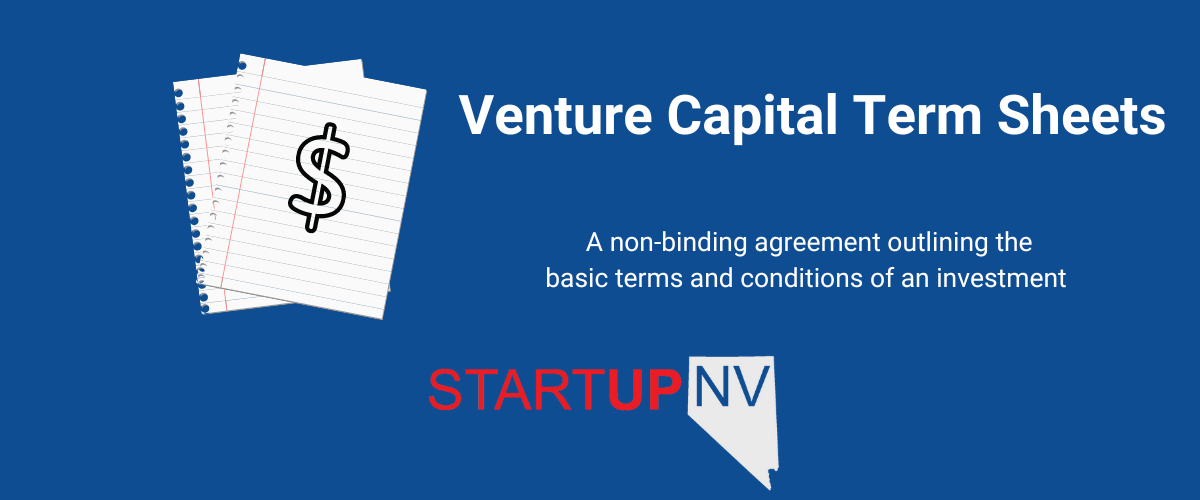
As an entrepreneur navigating the complex landscape of startup funding, encountering a term sheet is a significant milestone on the journey to securing venture capital investment. Term sheets serve as the blueprint for the terms and conditions of investment deals, outlining crucial details that shape the future relationship between investors and founders.
Understanding these documents is important for entrepreneurs, as they signify the height of rigorous negotiations and mark the beginning of a partnership that can profoundly influence the trajectory of a startup. In this blog post, we delve into the intricacies of venture capital term sheets, decoding common themes and key terms that every entrepreneur should understand. By familiarizing yourself with these essential components, you can approach investment discussions with confidence and strategy, ensuring that you’re well-prepared to seize opportunities and navigate the complexities of startup financing.
What is a term sheet?

A term sheet is a foundational document that outlines the key terms and conditions of a proposed investment deal between entrepreneurs and investors. Think of it as a preliminary agreement that serves as the basis for further negotiation and due diligence. While not legally binding in itself, a term sheet outlines the framework upon which the final investment agreement will be built. It covers a wide range of aspects, including valuation, investment amount, ownership stakes, governance rights, and potential exit strategies.
Essentially, the term sheet acts as a roadmap for both parties, guiding them through the complexities of structuring a mutually beneficial investment arrangement. Understanding the nuances of a term sheet is crucial for entrepreneurs, as it lays the groundwork for the partnership and sets the tone for future interactions with investors.
Key Ideas Found in Term Sheets
There are many ideas usually outlined in term sheets. Each term sheet is different and personalized for each individual investment. We’ve outlined the most common and need-to-know terms that will have your company flying through term sheets in no time.

Pre- and Post-money Valuation:
Before diving into the specifics of a term sheet, it’s essential to understand the concepts of pre-money and post-money valuation. Pre-money valuation refers to the value of a company before any investment is made, while post-money valuation includes the investment amount added to the pre-money valuation. Investors typically use these figures to determine their ownership stake in the company. As a startup founder, you should consider pre and post-money valuation because they directly impact the dilution of your ownership stake and the overall attractiveness of the investment deal.
Warrants & Dividends:
Warrants and dividends are additional components that investors may include in a term sheet to sweeten the deal or provide additional incentives. Warrants grant investors the option to purchase additional shares at a predetermined price within a specified timeframe, allowing them to capitalize on future growth. Dividends, on the other hand, entitle investors to a portion of the company’s profits. While warrants and dividends can enhance the attractiveness of an investment for investors, founders should carefully consider their implications on ownership dilution and future financial obligations.
Liquidation Preferences:
Liquidation preferences outline the order in which proceeds from a company’s sale or liquidation are distributed among shareholders. Investors often negotiate for preferences that prioritize the return of their investment capital before other shareholders receive payouts. While liquidation preferences provide downside protection for investors, founders should be mindful of their potential impact on the distribution of exit proceeds and the alignment of incentives between shareholders.
Option Pool:
An option pool is a reserve of shares set aside for future employee stock options and equity incentives. Investors may insist on the creation of an option pool as part of the investment terms to ensure that the company has adequate resources to attract and retain top talent. While option pools are essential for employee incentivization and talent acquisition, founders should carefully consider the size and allocation of the pool to avoid excessive dilution of existing shareholders.
Dilution & Anti-Dilution:
Dilution occurs when the issuance of new shares reduces the ownership percentage of existing shareholders. Investors may seek anti-dilution provisions in the term sheet to protect their ownership stake in the event of future equity financing rounds at lower valuations. While anti-dilution clauses safeguard investor interests, founders should be aware of their potential impact on the company’s flexibility in raising additional capital and the dilution of founder equity.
Addition of Board Members:
Investors often negotiate for the right to appoint board members or observers as a means of exerting influence and oversight on company operations. While having investor representation on the board can provide valuable expertise and strategic guidance, founders should carefully consider the implications for decision-making autonomy and corporate governance.
Investors include these key terms in term sheets to safeguard their investment, maximize returns, and align incentives with founders. As a startup founder, understanding these terms is crucial for negotiating favorable terms, preserving equity ownership, and ensuring the long-term success of your venture. By familiarizing yourself with these concepts, you can approach investment discussions with confidence and strategic insight, effectively positioning your startup for growth and success.
Benefits To Having a Term Sheet
Securing a term sheet marks a significant milestone in the journey of raising venture capital for your startup. While negotiating and finalizing the terms of a term sheet can be an intense process, the benefits it offers to both entrepreneurs and investors are substantial. Here are several advantages of having a term sheet:
Clarity and Structure: A term sheet provides a clear framework for the terms and conditions of the investment deal, helping both parties understand their rights, obligations, and expectations. By outlining key provisions upfront, a term sheet establishes a structured approach to negotiations and facilitates smoother transactional processes.
Investor Commitment: Receiving a term sheet signals a strong commitment from investors to fund your startup. It demonstrates their confidence in your business model, team, and growth potential, paving the way for further due diligence and closing the investment round.
Time Efficiency: Negotiating and finalizing a term sheet streamlines the investment process by focusing discussions on critical terms and avoiding protracted negotiations on minor details. This efficiency saves time for both entrepreneurs and investors, enabling them to allocate resources more effectively to other aspects of their business operations.
Basis for Due Diligence: A term sheet serves as a foundation for conducting due diligence, allowing investors to assess the legal, financial, and operational aspects of your startup in greater detail. By providing a roadmap of the proposed transaction, a term sheet guides due diligence efforts and accelerates the overall investment timeline.
Investor Alignment: The negotiation of a term sheet provides an opportunity for entrepreneurs and investors to align their interests and expectations regarding the future direction of the company. By discussing key terms and strategic objectives upfront, both parties can ensure that their visions are aligned, fostering a stronger and more collaborative partnership.
Legal Protection: While not legally binding in itself, a term sheet can offer legal protection by documenting the preliminary agreement reached between the parties. It serves as evidence of the intent to enter into a formal investment agreement, mitigating the risk of misunderstandings or disputes during the later stages of the transaction.
Competitive Advantage: Securing a term sheet from reputable investors can enhance your startup’s credibility and appeal to other potential investors. It signals validation of your business model and differentiation in a competitive market, increasing your ability to attract additional funding and strategic partnerships.
Venture capital term sheets are indispensable tools that shape the dynamics of investment deals, offering clarity, structure, and alignment for both entrepreneurs and investors. Understanding the key terms and implications outlined in these documents is essential for startup founders to navigate the complexities of fundraising and secure favorable investment terms.
As entrepreneurs embark on their journey to raise capital and grow their ventures, resources like StartUpNV provide invaluable support and guidance tailored to Nevada-based entrepreneurs and investors. By leveraging the expertise and resources available through startupnv.org, entrepreneurs can access a wealth of opportunities, mentorship, and networking connections to fuel their success in the vibrant startup ecosystem of Nevada. Other tools, like Investopedia or Y Combinator are great resources as well.


